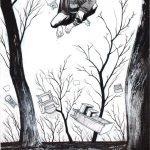I commented once that we were trauma-bonded.
He laughed it off—or maybe ignored it. I do not remember the exact reason it was dismissed, but I remember the feeling of being waved away, like I had said something silly or dramatic. Was I wrong?
Not on a psychological level.
A trauma bond is an emotional tether formed through cycles of abuse and reward. It is built in patterns—unpredictable punishment, then sudden closeness. Hurt, then apology. Dismissal, then affection. It does not matter if it is intentional – most of the time, it is not. That does not make it any less real.
The more I unravel over the last couple of years, the more I see how I ended up here. The patterns I kept. The ones I excused. The ones I mistook for kindness, compassion or love.
I stayed.
Not because I was weak, but because I believed in the idea of happiness or safety I have never truly known.
Because I thought if I could just be better—less reactive, more understanding, more forgiving, more anything—then maybe it would work. Maybe it would feel like care instead of quiet fear.
I apologised more times than I can count. For what? For reacting to being hurt, speaking up or not pretending everything was fine?
I covered for him. Again and again. Found the good. Gave the benefit of the doubt. Defended him to people who only ever wanted me safe. And still, somehow, I became the villain in his story. No matter what version he tells, I lose.
I have talked to friends, family, and professionals. I have turned the situation over like a stone in my hand, trying to see all sides – to hear what they are saying. And I do get it. But understanding what happened does not undo it or erase the impact. Nor do it make my day-to-day like okay.
Realising I was caught in a trauma bond does not fast-forward the healing. It just helps me see the trap for what it was.
The hardest part is admitting how much of myself I gave away, thinking it would help someone else feel whole. I shaped myself around his wounds. I bent backwards, trying not to disturb his sadness, believing it was my job to make it better—because I have always done that. Even now, if you put me in a room full of people laughing, I will find the one person sitting alone and glum. I will ask them if they are alright – it is a reflex.
Despite everything, I am cheerful by nature. But lately I wonder: is it real cheer, or is it survival? A performance I have perfected to keep everyone else from falling apart—so I do not have to look at my own unravelling? I do not know.
I do know this: I cannot keep apologising for being affected by things that have harmed me. Choosing sad people as companions will not help me heal. Burying my peace will not allow it to compose for someone else to find when they have none.
Intensity is not love.
No one is your responsibility (except yourself and your children).
The patterns you have learned to survive are not anything to be ashamed of.
Staying silent when you are hurting does not keep the peace.

